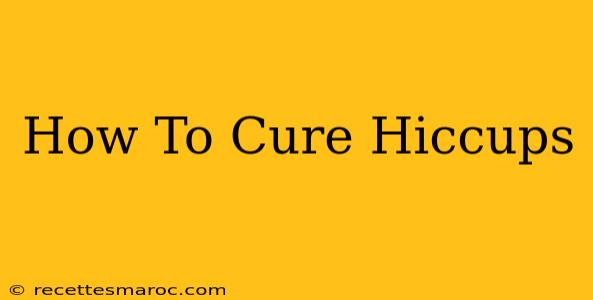Hiccups. That annoying, involuntary spasm of the diaphragm that leaves you gasping for air and disrupting conversations. We've all been there. While they usually pass quickly, persistent hiccups can be incredibly frustrating. This comprehensive guide explores various methods to cure hiccups, from simple home remedies to more involved techniques. Let's dive in and find the solution that works best for you!
Understanding Hiccups: The Science Behind the Spasms
Before we jump into the cures, let's briefly understand what causes hiccups. Hiccups occur when the phrenic nerve, which controls your diaphragm, gets irritated. This irritation leads to involuntary contractions of the diaphragm, causing the characteristic "hic" sound. Several factors can trigger this irritation, including:
- Eating too quickly: Swallowing air can irritate the phrenic nerve.
- Sudden temperature changes: A shift in body temperature can also trigger hiccups.
- Alcohol consumption: Excessive alcohol intake is a common culprit.
- Stress and anxiety: Nervousness can lead to involuntary muscle spasms, including hiccups.
- Certain medical conditions: In rare cases, persistent hiccups can indicate an underlying medical problem.
Home Remedies for Hiccups: Simple and Effective Solutions
Most hiccup episodes resolve on their own within a few minutes. However, if they persist, try these simple, readily available home remedies:
1. The Breath-Holding Technique:
This is a classic method. Hold your breath for as long as you comfortably can. The build-up of carbon dioxide can sometimes reset the diaphragm's rhythm.
2. The Paper Bag Trick (Use with Caution):
Breathe into a paper bag for a few seconds. This increases the carbon dioxide levels in your blood, which might help. Important Note: While this method is widely known, some medical professionals advise against it, as rebreathing exhaled air can reduce oxygen levels. Proceed with caution and stop if you feel lightheaded.
3. Drinking Water:
Slowly drink a glass of water without stopping. The act of swallowing can sometimes interrupt the hiccup cycle. Try drinking it upside down for added effect.
4. Distraction Techniques:
Sometimes, the best cure is simply to distract yourself. Engage in an activity that requires focus, such as solving a puzzle or engaging in a conversation. Shifting your attention can help your body relax and stop the spasms.
5. Gargling:
Gargling with water, or even a small amount of cold water can sometimes help. The action of gargling may provide relief.
When to Seek Medical Attention for Persistent Hiccups
While most hiccups are harmless and temporary, persistent hiccups (lasting for more than 48 hours) warrant a visit to your doctor. Prolonged hiccups can be a sign of an underlying medical issue, such as:
- Gastroesophageal reflux disease (GERD)
- Central nervous system disorders
- Irritation of the phrenic nerve
Don't hesitate to seek professional medical advice if your hiccups are persistent, severe, or accompanied by other symptoms like chest pain, difficulty breathing, or vomiting.
Conclusion: Finding Relief from Unwanted Hiccups
Hiccups are a common nuisance, but thankfully, there are many simple and effective ways to alleviate them. Try the home remedies mentioned above, and if they don't work, don't hesitate to consult a healthcare professional. Remember to stay calm and patient – most hiccups will pass on their own. Now go forth and conquer those pesky hiccups!

